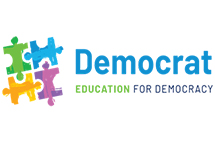New DEMOCRAT training workshop
On 26 November 2024, the DEMOCRAT team, of which Notus is a member, in collaboration with the Institut de Desenvolupament Professional (IDP) of the University of Barcelona, organised a new telematic workshop for teachers under the title Education for Democracy: Proposal for a tool to assess the competences of responsible democratic citizenship.
This event, which brought together 22 participants from schools in Catalonia, Spain and Latin America, aimed to present and discuss the tools for assessing competencies linked to responsible democratic citizenship developed by the DEMOCRAT project in recent months. These tools aim to assess the 4 key competences defined by the project: solidarity participation, deliberation, democratic resilience and critical thinking and judgement.
During the session, the methodology and principles of the DEMOCRAT project were presented, highlighting its commitment to sustainable, economic and social democracy, and the importance of collaboration with educational centres. Currently, this project involves more than 30 schools from different countries, including several schools in Catalonia, the Valencian Community and Madrid.
Evaluation tools presented
Two key tools developed in the framework of the DEMOCRAT project were presented:
- Teacher assessment tool: designed to help teachers assess students’ responsible democratic citizenship competences at both group and individual level.
- Student self-assessment tool: designed for students to reflect on their level of competence in these key areas.
Both tools, based on the Council of Europe’s Framework of Competences for Democratic Culture (RFCDC), use questionnaires that invite exploration of ‘how students see things, what they know, what they do and where they apply that knowledge’. In addition, they allow competences to be measured through four levels of complexity and depth.
Debate and group work
The workshop combined theoretical presentations with group dynamics, dividing participants into two groups according to educational level (primary and secondary). In these spaces, they discussed how to adapt the tools to the specific needs of each educational stage:
- Primary education: The need to simplify the questionnaire and use more attractive and appropriate visual elements, such as symbols and colours, to facilitate understanding was highlighted. It was proposed to involve students in the design of the questions and to use practical examples, such as children’s rights, to contextualise the assessments.
- Secondary education: Participants suggested modifying the language of the questionnaires to make them more accessible to students, reorganising the response options to avoid automatisms and reinforcing the idea that assessment does not have academic implications, thus encouraging honest answers.
One of the key ideas that emerged was to consider the questionnaires not only as assessment tools, but also as learning resources that can enrich classroom debate and reflection on democracy-related issues.
Main conclusions
Among the conclusions of the workshop, the need to balance the flexibility of the tools with the homogeneity necessary to facilitate comparison between the interventions of the different participating schools was highlighted. In addition, it was suggested to complement the evaluations with other instruments, such as questionnaires for families or collective consultations, in order to capture a broader view of the impact of the initiatives.
From Notus, we are grateful for the valuable contributions of the participants, which will contribute to refine these tools and promote the construction of a responsible democratic citizenship from the classroom.



Comments are closed.